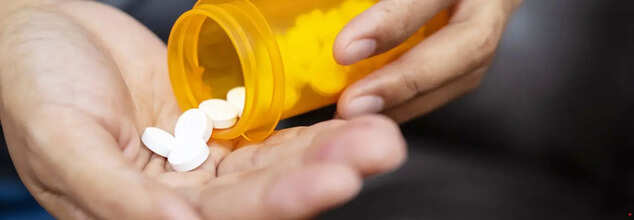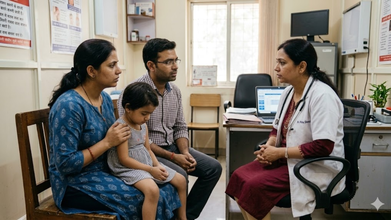- Health Conditions A-Z
- Health & Wellness
- Nutrition
- Fitness
- Health News
- Ayurveda
- Videos
- Medicine A-Z
- Parenting
Alcohol And Medications: How Long Should You Wait Before Mixing Them?

Alcohol And Medication (Credit: Canva)
Alcohol is injurious to your health, there is no doubt about it. But what happens when you combine it with your medications? It leads to serious health consequences. While many people think a single drink might not hurt, the truth is that even small amounts of alcohol can interact dangerously with some drugs. So how much should you wait after having that glass of wine before you could pop in your pills? And more importantly, why alcohol and medications are a risky combination?
When alcohol interacts with medications, the effects can range from mild to life-threatening. Common symptoms include drowsiness, dizziness, impaired judgment, and trouble concentrating. More severe consequences include liver damage, irregular heartbeats, and, in rare cases, death. These risks depend on several factors, such as the type of medication, the amount of alcohol consumed, and individual factors like age, sex, and metabolism.
When Can You Drink After Taking Medications?
The time when alcohol should be taken after taking any sort of pills varies widely based on the drug involved. Some medications may require only a few hours of abstinence, while others necessitate waiting days or even weeks.
Antihistamines, like diphenhydramine and loratadine, are medications used to treat seasonal allergies. Alcohol increases the sedative effects of these drugs, leading to heightened drowsiness and a higher risk of accidents. You should avoid alcohol entirely while taking these medications.
Antibiotics and Antifungals such as metronidazole and ketoconazole treat various bacterial and fungal infections. Combining these with alcohol can cause nausea, vomiting, rapid heartbeat, or even liver damage. Always check with your healthcare provider, but a general rule is to wait 48-72 hours after your last dose before drinking.
Mixing Antidepressants and Anti-Anxiety Medications with alcohol can worsen symptoms like dizziness, drowsiness, and impaired motor skills. Some antidepressants, such as monoamine oxidase inhibitors (MAOIs), can lead to dangerous spikes in blood pressure when combined with alcohol.
Medications That Require Extra Caution
Certain drug categories pose particularly high risks when combined with alcohol:
- Blood Thinners including warfarin increase the risk of severe bleeding when paired with alcohol.
- Cholesterol-Lowering Drugs like statins can lead to liver damage if combined with excessive alcohol.
- Painkillers like Opioids and over-the-counter drugs like acetaminophen can cause slowed breathing, liver damage, or overdose when mixed with alcohol.
- Sleeping Pills combining alcohol with sedatives increases the risk of slowed breathing, impaired motor skills, and even death.
It is pertinent to note that age and sex also influence how alcohol interacts with medications. Older adults metabolize alcohol more slowly and are more likely to be on multiple medications, increasing their risk. Similarly, people assigned female at birth generally have higher blood alcohol levels than their male counterparts, making them more susceptible to interactions.
When Symptoms Don’t Add Up: How Hidden Genetic Conditions Go Undetected for Years

(AI Generated)
In India, it is not uncommon for families to travel across cities, sometimes across states, seeking answers for symptoms that simply don’t make sense. A child who is not meeting developmental milestones. A young adult with unexplained muscle weakness. Recurrent hospital visits with no clear diagnosis.
For many, this long and frustrating search for clarity is what medicine calls the diagnostic odyssey.
Rare diseases are individually uncommon, but collectively they affect millions of people worldwide. Rare diseases affect an estimated 263–446 million people worldwide, spanning every geography, healthcare system, and socioeconomic context. India alone is estimated to have 70 million people living with rare diseases.
Importantly, although 70%–80% of rare diseases are genetic in origin, routine medical practices often consider genetic testing only after years of inconclusive evaluations.
In India, this challenge is amplified by several factors, including limited awareness of rare conditions, uneven access to specialized testing across regions, and a tendency to treat symptoms individually rather than look for a unifying cause.
A child may see a neurologist for seizures, a gastroenterologist for feeding issues, and a developmental pediatrician for delays, without anyone connecting the dots.
Studies have shown that patients and their families frequently wait years before receiving a confirmed diagnosis. Globally, rare disease diagnosis can take anywhere between 5–30 years.
In a country like India, where healthcare expenses are often paid out-of-pocket, this prolonged uncertainty can be devastating. Beyond cost, there is the psychological toll; parents wondering if they missed something and adult patients often questioning whether their symptoms are “all in their head”. During this period, families undergo repeated tests, face conflicting opinions, and bear significant emotional and financial strains.
Research shows that families experience profound emotional burden during the diagnostic odyssey, including stress, anxiety, and feelings of isolation.
Why Do These Conditions Stay Undetected For Years?
In many cases, the explanation is written into a person’s DNA. Genetic disorders rarely announce themselves clearly; instead, they often mimic common illnesses. Fatigue may look like anemia, developmental delay may resemble a learning difficulty, and repeated infections might be treated as isolated events rather than part of a larger pattern. Because the symptoms overlap with more familiar conditions, doctors naturally begin by treating what appears most likely.
Most healthcare systems also follow a step-by-step diagnostic approach; rule out the common causes first, then move to less common ones if symptoms persist. While this method works well for typical illnesses, it can significantly delay answers for rare genetic conditions. Without looking directly at the genetic blueprint, the underlying cause may remain hidden, even as the visible symptoms are managed one at a time.
Today, advances in genomic technologies such as whole-exome sequencing (WES) and whole-genome sequencing (WGS) allow us to examine thousands of genes simultaneously. Rather than guessing which gene might be responsible, we can comprehensively analyze a patient’s DNA to search for answers.
Evidence increasingly supports the use of genomic sequencing earlier in the diagnosis and care of rare diseases. Similarly, studies highlight how genomic testing not only provides diagnoses but also directly influences treatment decisions and long-term care planning.
In the Indian context, integrating genetic testing earlier could transform care. Instead of years of fragmented consultations, patients could receive a precise diagnosis sooner. This clarity can:
- Prevent unnecessary or repeated investigations
- Guide appropriate treatment strategies
- Inform family members about potential risks
- Enable informed decisions about future pregnancies
- Equally important, it replaces uncertainty with understanding.
Encouragingly, awareness around rare diseases is growing in India, and conversations around early genomic testing are becoming more mainstream. As technology becomes more affordable and accessible, we have an opportunity to fundamentally change the patient journey.
No family should spend years searching for answers when science has the tools to help. By embracing genomic medicine earlier in the diagnostic pathway, we can shorten the odyssey, reduce suffering, and empower families with clarity.
Because when symptoms don’t add up, sometimes the answer lies written in our genes.
Bill Clinton’s Trembling Hand Sparks Parkinson’s Disease Health Concern

Former US president Bill Clinton’s recent public appearance has sparked inquires of Parkinson’s disease in the media. The video was made public by the GOP-led House Oversight Committee, and it showed Clinton alongside his legal team giving his testimony concerning his past associations with the late convicted sex offender Jeffery Epstein.
Social media users quickly pointed out that during the video, the former president’s hand visibly trembled as he raised his glass of water. Hand tremors are often associated with cognitive decline, as it is known as an early sign of Parkinson’s.
The footage, captured at his home in Chappaqua, New York, showed a specific moment where Clinton’s hands shook as Representative Nancy Mace questioned him.
Are Hand Tremors A Sign Of Parkinson’s?
According to Parkinson’s Foundation, for many, a tremor (shaking) is the first sign of Parkinson’s. The most common type is a "resting tremor." This means your hand or leg might shake while you are sitting still or walking, but the shaking usually stops or gets better when you actually use that body part like reaching out to grab a glass of water.
Most people with Parkinson’s (70% to 90%) will have a tremor at some point. Interestingly, patients who have a resting tremor often see their symptoms progress more slowly than those who don't.

Could Hand Tremors Indicate Other Issues?
WashU Medicine explains that essential tremor is the most common reason for shaky hands, but it’s different from Parkinson’s. With essential tremors, your hands shake while you are using them, like holding a deck of cards. Parkinson’s usually causes shaking only when hands are resting. So what are some factors that can cause hand tremors?
Lifestyle and Stress
Almost everyone has a tiny, invisible tremor. However, things like high stress, being very tired, or feeling angry can make that shake visible. Drinking too much caffeine or smoking cigarettes can also cause your hands to tremble temporarily until the stimulants leave.
Age
While anyone can develop a tremor, it is most common in people over age 65. This type of shaking is usually "benign," meaning it isn't dangerous. It mostly affects the hands, head, or voice, and rarely spreads to the legs or feet.
Medication Side Effects and Withdrawal
Sometimes, the medicine you take for other things is the culprit. Drugs for asthma, seizures, or depression can cause shakiness. Shaking can also happen if you are going through alcohol withdrawal or using tobacco, as these substances directly affect your nervous system.
Potential Underlying Health Conditions
Hand tremors can sometimes be a "warning light" for other health issues. Problems like an overactive thyroid, or rare conditions where copper builds up in the body, can cause shaking. A doctor can run simple tests to see if these are the cause.
Clinton’s History with "Aging Tremors"
While the footage may appear concerning to new viewers, these tremors are a documented part of Clinton's health history. As far back as 2013, the 42nd President addressed similar concerns, clarifying that he had undergone medical testing to rule out Parkinson’s.
At the time, Clinton explained that his doctors attributed the shaking to a "normal aging phenomenon." He noted that while he was initially concerned enough to seek a professional diagnosis, he felt relieved to learn the tremors were not related to a progressive disease.
1 In Every 8 School-going Children Is Obese In Kolkata: Study

Credits: LinkedIn; Canva
1 in every 8 child in Kolkata school between the age of 12 to 16 is obese. A new study conducted in Kolkata schools by a global obesity awareness organization revealed this data. Wednesday, the same day as Holi in India, was also the World Obesity Day. In Kolkata, the issue is concerning, especially when children are at the center of it. The Howrah bridge also lit with blue and yellow lights, the colors to symbolize obesity awareness.
What Did The Study Reveal About Obese Children?
An initiative by METTA Dana Foundation, a global academic outreach organization with its focus on childhood obesity revealed the rising case of childhood obesity in Kolkata. "Childhood obesity is rising rapidly, with the prevalence among school-aged children increasing from 4% in 1975 to almost 20% in 2022," said Debashis Basu, endocrinologist and chairman of METTA Dana Foundation. This is seen as a five-fold increase over five decades.
Basu further said, "The rise is sharpest in low-and-middle-income countries like India and Bangladesh. Childhood obesity often continues into adulthood, increasing the risk of serious non-communicable diseases, such as diabetes, heart disease and certain cancers." Basu also said that 13 per cent of such cancers are related to childhood obesity.
He said that early signs of chronic diseases are already appearing in children. He also noted that around "a fourth of Kolkata's children are diabetic or are in a pre-diabetic stage".
Obesity In Young People
Globally, as per a Lancet study, more than half of all adults and a third of children and adolescents will become overweight by 2050. The study also notes that obesity is becoming a bigger concern and it could impact around 21.8 crore men and 23.1 crore women in India.
In fact, India is projected to have world's second highest number of obese kids and adolescents, aged between five and 14 years. This means around 16 million boys and 14 million girls could be overweight.
One of the biggest challenges of being overweight is diabetes, as Basu also noted. In a previous conversation with Health and Me Dr Mayank Lodha Seth, chief pathologist at Redcliffe Labs, noted that diabetes is no longer a disease of aging, young people, including teenagers too are affected.
Also Read: Diabetes No Longer A Disease Of Aging; Four Things Youth Should Know About It, According To Doctor
"We took this initiative to revive it [World Obesity Day] this year with support from National Institute of Nutrition. India is beginning to face the triple burden of malnutrition, stunting and wasting, micronutrient deficiencies, and obesity- often coexisting in the same family or the same person in various stages," said Basu.
Why Is India Facing A Crisis In Youth Obesity?
According to UNICEF’s Child Nutrition Global Report 2025, obesity, for the first time, surpassed underweight globally as the most common form of malnutrition among school-aged children and adolescents.
According to the National Family Health Survey (NFHS) data, India is witnessing a rapid surge in overweight and obesity among under-five children under five, with prevalence rising by 127 per cent (from 1.5 per cent to 3.4 per cent between NFHS 3 (2005-06) and NFHS 5 (2019-21). Similarly, adolescent girls and boys have seen an increase in overweight and obesity of 125 per cent (from 2.4 per cent to 5.4 per cent) and 288 per cent (from 1.7 per cent to 6.6 per cent) respectively.
A recent child nutrition report points to a worrying shift in the way young people in India eat. Fast foods, ultra-processed snacks, and sugary drinks that are high in fat, salt, and sugar are steadily replacing fruits, vegetables, and traditional home-cooked meals. These choices are not always driven by taste alone. Easy availability and aggressive marketing campaigns aimed at children and teenagers are increasingly shaping what they want to eat.
Early-life factors are also playing a role in the rising numbers. Poor maternal nutrition during pregnancy, inadequate infant feeding practices, and low rates of exclusive breastfeeding can influence a child’s long-term health and metabolism. Social and gender norms add another layer to the problem. In many households, adolescent girls and women still eat last and often the least, which can affect nutritional balance early in life and contribute to unhealthy patterns later.
At the same time, lifestyles among young people are rapidly changing. The growing consumption of ultra-processed foods and sugar-sweetened beverages is being combined with lower levels of physical activity. Children and teenagers today spend more time on screens, whether for schoolwork, entertainment, or social media, leaving less time for outdoor play and movement. This shift towards sedentary routines is one of the key reasons obesity is increasing among the younger population.
The environment around food is also changing. Urban areas and even smaller towns are now saturated with packaged and processed food options that are quick, cheap, and heavily promoted. When healthier choices are less visible or less accessible, children and adolescents are more likely to gravitate toward convenient, calorie-dense products.
Data from UNICEF’s U-Report poll, which surveyed adolescents and young adults aged 13 to 24 across 171 countries, highlights the scale of marketing exposure. More than two-thirds of young people said they regularly encounter food advertisements. In the week before the poll, 75 per cent reported seeing ads for sugary drinks, fast food, or packaged snacks. Social media was the biggest source of exposure at 52 per cent, followed by the internet at 46 per cent and television at 43 per cent. Not surprisingly, three in five respondents admitted that these advertisements made them want to try the products they saw.
Experts say this constant exposure is shaping dietary habits from an early age. When young people repeatedly see unhealthy foods promoted as fun, trendy, or aspirational, it normalizes those choices.
© 2024 Bennett, Coleman & Company Limited

